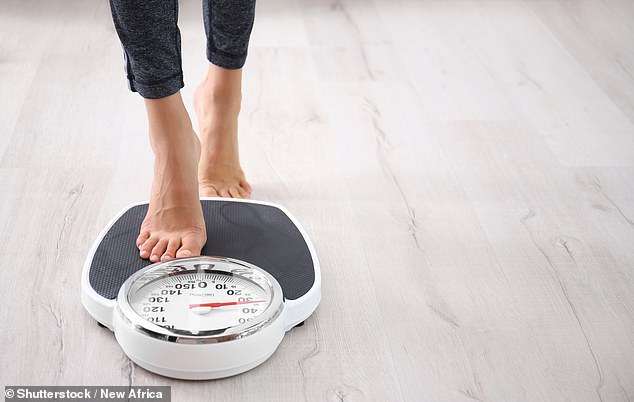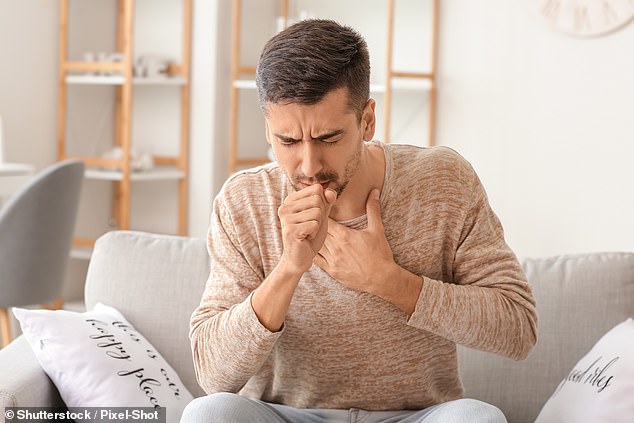DR. ELLIE CANNON: I’m losing weight and I don’t know why – how can I get it back?
Over the last two years I have lost about a stone each. I eat healthy food, with lots of fruit and vegetables, chicken, fish and eggs. A few years ago I was a bit overweight, but I really don’t want to lose any more weight – but there’s never any advice for people who need to gain weight. I’m almost 80. Can you help?
‘Healthy eating’ is an interesting term without any real definition.
For someone who needs to reduce their risk of heart disease or has diabetes, this would mean a diet that helps maintain a healthy weight, with low sugar and high fiber from fresh vegetables. But this may not be ‘healthy’ for everyone. For example, people with irritable bowel syndrome (IBS) should avoid certain fruits and vegetables. And people with diverticulitis – a painful but common intestinal problem – should avoid certain fibers. If someone needs to gain weight, fruits and vegetables won’t do much.
As people age, they may lose weight due to a reduction in muscle mass, and in general, older people have less appetite.
To gain weight, a dietitian may recommend increasing the amount of protein and carbohydrates at each meal, in addition to adding high-calorie foods such as cheese or cream to recipes.
To gain weight, a dietitian may recommend increasing the amount of protein and carbohydrates at each meal, in addition to adding high-calorie foods such as cheese or cream to recipes (Stock Image)
If you have trouble eating, you can buy fortified drinks that are quite small in volume (about the size of a carton of fruit juice) but contain a large number of calories.
For this reason it is not always possible to see an NHS dietitian, but it is worth asking your GP for a referral. Unintentional weight loss is always a warning sign to a doctor, especially in the elderly, as it can be a warning sign of cancer.
Normally, a doctor will want to conduct an examination and run some tests to rule out sinister causes of weight loss. This may include blood tests in addition to stool tests and perhaps even an ultrasound.
I occasionally experience excruciating pain that goes from the back of my throat to my chest. I can go months without an episode and then it can happen two or three times in a row. The pain is so intense – it feels like I’m trying to swallow a tennis ball – that I’m rooted to the spot and unable to move. What is it?
It may be surprising, but sore throats in women can come from the heart.
The symptoms of a type of heart condition known as angina mainly cause chest pain, but women may also experience neck, jaw, and throat pain.

As people age, they may lose weight due to a reduction in muscle mass, and in general older people have less appetite (Stock Image)
These warning signs are often overlooked until a full-blown heart attack occurs, so a severe sore throat should always warrant a visit to the GP for examination.
Once heart disease has been ruled out, it is worth considering acid reflux. This is when acid flows from the stomach back into the esophagus, which can happen after a heavy meal or in certain positions. This can irritate the throat and cause some pain. It should go away very easily with an over-the-counter antacid. There are less common causes of this pain, such as a side effect of cancer treatment, the fungal infection candida and, rarely, blood disorders.
Pain in the back of the throat and up to the chest can even be a side effect of medications or a large thyroid gland pressing on the throat. A camera test called a nasoendoscopy, performed by an otolaryngologist to view the throat, larynx, and structures surrounding it, may also be considered.
A year ago I was diagnosed with a Baker’s cyst behind my right knee. It is very painful but my GP said nothing would be done to treat it unless it became infected. Is there anything I can do, because the discomfort is always there.
A Baker’s cyst, also called a popliteal cyst, is a small, fluid-filled lump that forms at the back of the knee. They may be related to arthritis in old age or simply occur spontaneously.

Symptoms of a type of heart condition known as angina mainly cause chest pain, but women may also experience neck, jaw and throat pain (Stock Image)
Swelling in the back of the knee should always be assessed by a doctor to rule out serious conditions. This could be a deep vein thrombosis, a blood clot in the veins of the legs.
In most people, Baker’s cysts don’t cause any problems, so no treatment is needed – but they can be painful. They can also increase the risk of blood clots because of the pressure they put on the rest of the leg.
If someone is in pain, physical therapy and over-the-counter pain relievers are usually recommended. A GP or pharmacist should be able to provide advice. But if this has not helped, a specialist orthopedic surgeon or community musculoskeletal team may offer aspiration of the cyst: extracting the fluid and then injecting steroids.
An operation to remove the cyst is usually only used for someone who has a lot of pain or has difficulty moving, because in many cases the cyst returns after surgery.
A sweet way to beat a bad cough
The results come from my reader survey on what you use to soothe an annoying cough – and it’s good news for those with a sweet tooth, as several of you praised eating chocolate.
Health chiefs moved earlier this month to ban codeine linctus, an effective cough syrup that has unfortunately been widely abused by addicts. I understand the motive, but was wondering what else I could suggest to patients.
And I’m happy to reveal that there is some scientific backing for chocolate as relief. Studies suggest that theobromine, a derivative of cocoa, could be more effective than codeine in relieving cough symptoms. In the study, volunteers swallowed capsules containing 300 mg of theobromine – the equivalent of a few squares of very dark chocolate.
But the studies were small, so those who tried this approach might not be successful. And yet I can’t think of a better way to contribute to ongoing research…

Health chiefs moved earlier this month to ban codeine linctus, an effective cough syrup that has unfortunately been widely abused by addicts. I understand the motive, but was wondering what else I could suggest to patients (Stock Image)
Stop promoting HRT as a must-have for menopause
When I raised concerns two years ago that the ‘menopause revolution’ – supported by TV presenter Davina McCall and broadcaster Mariella Frostrup, above – was scaring women into taking HRT they didn’t need, I was accused of to trivialize women’s life experiences. Of course this is nonsense.
My point was that medication is great IF you need it. But most problems during menopause are not due to hormones – so HRT is not a cure.
The fear mongering seemed to come from private doctors and celebrities who benefit financially from the issue.
So I was interested in reading articles in the medical journal The Lancet that said the same thing I did. Top women’s health experts have criticized the ‘over-medicalisation’ of menopause, which appears to be wrongly labeling it as a disease.
They are pursuing an approach that does not see HRT as a panacea – and I completely agree with that.
Do you have a question for Dr. Ellie Cannon? Email DrEllie@mailonsunday.co.uk
Dr. Cannon cannot enter into personal correspondence and her responses must be placed in a general context.
